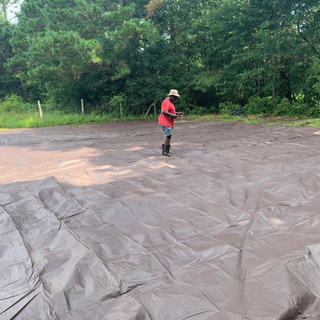Projects and Projections
- Belinda Jones

- Jul 17, 2020
- 4 min read

Hello Farm Friends,
Early spring 2020 we applied for and received a grant offered by RAFI Farmers of Color Network Fund. They provide support to farmers for new and innovative agricultural projects & ideas that will increase farm viability, support community food sovereignty efforts, preserve traditional & cultural farming practices, as well as assist local food economies.
They offered $5000 awards to Individual farmers, and $7000 for Collaborative projects involving 2 or more farmers.
Who is Eligible:
Their focus this year was on North Carolina, Virginia, and South Carolina farmers who are agriculturally dependent and who have viable ideas for innovative agricultural projects to increase farm sustainability.
They fund innovative, replicable on-farm projects that:
● demonstrate an ability to increase farm sustainability
● establish new markets for local products and services
● develop new uses for existing greenhouses, farm facilities, and equipment
● add value to existing farm products by developing innovative processing, packaging, or marketing
● make optimal use of on-farm and natural resources
Our project is to introduce a no-till farming method on the farm to improve soil health and therefore productivity. We use it one a small scale but want to expand it to include all planting zones. We submitted research information to support our project along with a list of materials needed and a budget. Our proposal was accepted and awarded $5,000. It calls for sections of land to be mowed and then covered by thick agricultural tarp for one to two months to kill the plant life beneath. Once that occurs the tarp is removed and the plot is then covered with a compost or manure to begin planting. We chose Black Kow because it’s one we regularly use and it’s a high quality product. Cow manure is probably the best all-around, as it contains a balanced level of N, P, and K in moderate amounts. We have compost bins and can contribute some of our own compost as well.
The tarps and manure were ordered as soon as the checks arrived, but the availability of the materials was delayed. The stores had a hard time filling the order. We received calls from our grantors who wanted to know a reason for the delay, but everything finally arrived July 14 and 15. We mowed and covered one zone this morning.

We also received a $1,000 mini grant from F.A.R.M.S., Family Agriculture Resource Management Services, “a national nonprofit dedicated to reversing small farmland loss to ensure generational wealth and reducing hunger in rural low-income communities. We also assist farmers with retail market expansion to ensure future farm revenue. We provide these services with integrity and quality".
Funding from F.A.R.M.S. was designated to repair our hoop house (seasonal high tunnel) and poultry housing areas. We contacted the hoop house company from which we made our original purchase, informed the owner of the situation, and made arrangements for the repair. The funding we received paid for the two man team to travel and offer their assistance to us for one day.
We purchased the items needed to make the poultry housing repairs and are close to setting dates for that work. Some of you have asked about volunteering on the farm. We will have a few ‘Farm Work Days’ coming up soon. On those days we will be working on the poultry housing and spreading out the manure, not all on the same day, the work will be spread out. If you would like to come out and help let us know, we will work out how many people can safely work with us and comply with Covid19 restrictions.
The heat wave has had a devastating result on the farm. Several of our plants are under a great deal of stress and beginning to die even with the drip irrigation. We have more started plants ready to replace them, but they will need a few weeks before they will bear any vegetables. Our connection to sister farms in the Lowcountry that use the same methods has been a real blessing, but even their fields are not as productive at this time. For the next three weeks we may not have the variety we would like to offer. During that time, we will be transplanting our started plants and providing extra attention to the plants that are still producing. We suffered other losses from animals, raccoons got in our melon patch and destroyed our melons. We had beautiful watermelons and they were bitten into and gouged out. We received started plants from an Extension agent for us to participate in a trial of a new variety, sadly they were also among the destroyed melons.

What’s next you may wonder. We have started more lettuce varieties, snap peas, spinach, chard, rutabaga, collards, mustard greens, broccoli, pumpkin, squash varieties, cucumber, tomatoes, and carrots to name a few. It seems like it will be spring all over again! Many of these started plants will go into the soil of the no till zone.
At the same time, we have a few value-added items that will be available for a while. We harvested honey from one of our bee colonies, so we do have jars available. Last summer we had just churned ice cream at our stand so that’s coming back too. As long as our ‘friendly fowl’ lay, we will have eggs available, both chicken and duck. Lemons are plenteous and as soon as they ripen, we will offer them. Scuppernongs, those big, juicy grapes that are greenish, burnished bronze, or green-gold in color, will be ripe in late August and early September. There should be enough for everyone to have some! We’ll also have sweet potatoes in the fall.
Finally, we’re processing a few of our pastured meat birds today. There will be a chicken included in the packages tomorrow.

















Comments